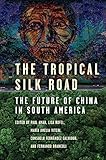The Tropical Silk Road : The Future of China in South America.
By: Amar, Paul.
Contributor(s): Rofel, Lisa | Brancoli, Fernando | Viteri, Maria Amelia | Fernandez, Consuelo.
Material type: BookPublisher: Redwood City : Stanford University Press, 2022Copyright date: �2022Edition: 1st ed.Description: 1 online resource (474 pages).Content type: text Media type: computer Carrier type: online resourceISBN: 9781503633810.Genre/Form: Electronic books.DDC classification: 337.5108 Online resources: Click to View
BookPublisher: Redwood City : Stanford University Press, 2022Copyright date: �2022Edition: 1st ed.Description: 1 online resource (474 pages).Content type: text Media type: computer Carrier type: online resourceISBN: 9781503633810.Genre/Form: Electronic books.DDC classification: 337.5108 Online resources: Click to View | Item type | Current location | Collection | Call number | Copy number | Status | Date due | Item holds |
|---|---|---|---|---|---|---|---|
 E-book
E-book
|
IUKL Library | Subscripti | 1 | Available |
Cover -- Title Page -- Copyright -- Contents -- Acknowledgments -- List of Contributors -- Introduction: China Stepping Out, the Amazon Biome, and South American Populism -- Part 1: Global Asia, New Imaginaries, and Media Visibilities -- 1.1 China's State and Social Media Narratives about Brazil during the COVID-19 Pandemic -- 1.2 Cracks in the Coca Codo Sinclair Hydroelectric Project: Infrastructures and Disasters from a Masculine Vision of Development -- 1.3 Brazil and China's "Inevitable Marriage"? Post-Bolsonaro Futures and Beijing's Shift from North America to South America -- 1.4 The China-Ecuador Relationship: From Correa's Neodevelopmentalist "Reformism" to Moreno's "Postreformism" during China's Credit Crunch (2006-2021) -- 1.5 China Studies in Brazil: Leste Vermelho and Innovations in South-South Academic Partnership -- 1.6 Chinese Financing and Direct Foreign Investment in Ecuador: An Interests and Benefits Perspective on Relations between States through the Lens of the Win-Win Principle -- Part 2: Indigenous Epistemologies and Maroon Modernities -- 2.1 An Indigenous Theory of Risk: The Cosmopolitan Munduruku Analyze Chinese Megaprojects at Tapaj�os-Teles Pires -- 2.2 Challenges for the Shuar in the Face of Globalization and Extractivism: Reflections from the Shuar Federation of Zamora Chinchipe -- 2.3 "Yes, We Do Know Why We Protest": Indigenous Challenges to Extractivism in Ecuador, Looking beyond the National Strike of October 2019 -- Part 3: Grassroots Perspectives on the Fragmentation of BRICS -- 3.1 From Elusiveness to Ideological Extravaganza: Gender and Sexuality in Brazil-China Relations -- 3.2 The Refraction of Chinese Capital in Amazonian Entrep�ots and the Infrastructure of a Global Sacrifice Zone -- 3.3 "The Bank We Want": Chinese and Brazilian Activism around and within the BRICS New Development Bank.
3.4 R�io Blanco: The Big Stumbling Block to the Advancement of China's Mining Interests in Ecuador -- 3.5 Protectionism for Business, Precarization for Labor: China's Investment-Protection Treaties and Community Struggles in the Latin American and Caribbean Region -- Part 4: Logistics Regimes and Mining -- 4.1 A Mine, a Dam, and the Chinese-Ecuadorian Politics of Knowledge -- 4.2 Rafael Correa's Administration of Promises and the Impact of Its Policies on the Human Rights of Indigenous Groups -- 4.3 China Oil and Foodstuffs Corporation in the Tapaj�os River "Logistics Corridor": A Case Study of Socioenvironmental Transformation in Brazil's Northeast -- 4.4 Deforestation, Enclosures, and Militias: The Logistics "Revolution" in the Port of Cajueiro, Maranh�ao -- Part 5: Hydroelectrics and Railroads -- 5.1 Hungry and Backward Waters: Events, Actors, and Challenges Surrounding the Coca Codo Sinclair Hydroelectric Project in Times of COVID-19 -- 5.2 Electrification of Forest Biomes: Xingu-Rio Lines, Chinese Presence, and the Sociotechnological Impact of the Belo Monte Hydroelectric Dam -- 5.3 Vanity Projects, Waterfall Implosions, and the Local Impacts of Megaproject Partnerships -- 5.4 "Yes We Do Exist": Ferrogr�ao Railway, Indigenous Voices in the Trail of Trade Corridors, and Building the Axis of a "Brazilian Pragmatist Policy" toward China -- 5.5 Green Marketing Extractivism in the Amazon: Imaginaries of the Ministry versus Realities of the Land -- Part 6: Race, Class, and Urban Geographies -- 6.1 Steel Industry's Legacies on the Outskirts of Rio de Janeiro and White Brazilian Capital-State Alliances: A Feminist Approach -- 6.2 Rio de Janeiro's Unruly Carbon Periphery: Community Entrepreneurs, Chinese Investors, and the Reappropriation of the Ruins of the COMPERJ Oil Port-and-Pipeline Megaproject.
6.3 From Cheap Credit to Rapid Frustration: China and Real Estate in Rio de Janeiro -- 6.4 The China-Ecuador Economic Relationship's Impact on Unemployment during the Administration of President Moreno -- Part 7: Hybridity of Transnational Labor -- 7.1 Savage Factories of the Manaus Free Trade Zone: Chinese Investments in the Amazon and Social Impacts on Workers -- 7.2 National Development Priorities and Transnational Workplace Inequalities: Challenges for China's State-Sponsored Construction Projects in Ecuador -- 7.3 Rio's Phantom Dubai? Porto do A�cu, Chinese Investments, and the Geopolitical Specter of Brazilian Mineral Booms -- Index -- Back Cover.
Description based on publisher supplied metadata and other sources.
Electronic reproduction. Ann Arbor, Michigan : ProQuest Ebook Central, 2023. Available via World Wide Web. Access may be limited to ProQuest Ebook Central affiliated libraries.


There are no comments for this item.